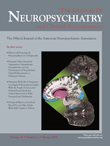Antipsychotic Treatment Improves Outcome in Herpes Simplex Encephalitis: A Case Report
SIR: Herpes simplex virus encephalitis is the most common fatal sporadic encephalitis in humans. 1 Psychiatric symptoms, especially delusions and hallucinations, are not uncommon in herpes simplex virus encephalitis. 1
The authors report a 31-year-old woman of South-East Asian origin, with no past or family history of mental illness, who had a diagnosis of herpes simplex virus encephalitis, confirmed by polymerase chain reaction. A magnetic resonance imaging of her head and an electroencephalogram were reported as normal. While on the ward, she was noted to be responding to auditory hallucinations. She was disorientated to time and place. She appeared perplexed and showed emotional lability. She showed no insight into her condition. The Addenbrooke’s Cognitive Examination (ACE) 2 was administered, yielding a score of 74/100 with impairment evident in orientation, verbal fluency and anterograde and retrograde memory. She was discharged from hospital 6 weeks later and followed up in our neuropsychiatry clinic. Her husband reported that she was not the person she had been. She showed marked apathy, was not interested in looking after her child and spent the whole day sitting on her sofa watching TV. In addition, he said she was experiencing significant memory problems, being unable to remember recent events in her life or people she was used to seeing. Latterly, she would start talking to strangers believing that they were known to her. On examination, she appeared distractible, focusing in turn on different aspects of the room. She showed a rather fatuous affect and occasionally giggled childishly. The authors could not elicit any overt psychotic symptoms. She showed little change over the next 5 months. The authors decided to give her a trial of antipsychotic medication, suspecting that there might have been some hidden psychotic presentation, and she was started on risperidone 1 mg twice daily. After 1 week, the patient showed a marked improvement. She started taking an interest in things around her, began to prepare meals at home and to look after her son. Her husband said that she was no longer misidentifying people. On examination, she was less distractible and slightly more articulate in her responses. The ACE score after treatment was 86/100. Furthermore, she showed some insight, recognizing that something had happened to her and beginning to remember part of her stay in hospital.
The possibility of an underlying psychotic process was raised mainly on account of her distractibility, fatuous affect and the history of misidentification given by her husband. Her rapid response to antipsychotic medication both in terms of her mental state and her functioning adds some support to this claim. The authors think that it is important to consider the possibility of an underlying psychotic illness in patients following herpes encephalitis (HSE) particularly when personality/behavioral changes and cognitive impairment are prominent and even when overt psychotic symptoms appear to be absent. Further cognitive decline after the acute stage of the illness is uncommon, 3 and this may also alert to the possibility of an underlying psychotic process. Awareness of such a possibility carries important implications for management and prognosis of the patient.
1. Kennedy PG, Chaudhuri A: Herpes simplex encephalitis. J Neurol Neurosurg Psychiatry 2002; 73:237–238Google Scholar
2. Mathuranath PS, Nestor PJ, Berrios GE, Rakowicz W, Hodges JR: A brief cognitive test battery to differentiate alzheimer’s disease and frontotemporal dementia. Neurology 2000; 55:1613–1620Google Scholar
3. Hokkanen L, Launes J: Cognitive recovery instead of decline after acute encephalitis: a prospective follow up study. J Neurol Neurosurg Psychiatry 1997; 63:222–227Google Scholar



